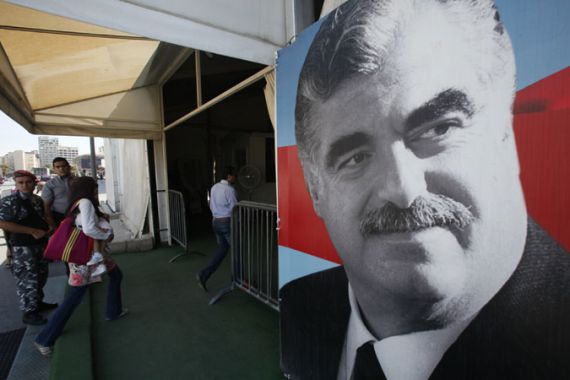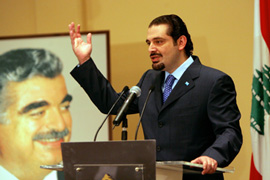Timeline: STL investigation
Key dates leading up to the Special Tribunal for Lebanon at The Hague.

Rafik al-Hariri, the former Lebanese prime minister, was killed in a bomb blast in downtown Beirut on February 14, 2005.
Twenty-two other people were also killed in the blast which targeted his motorcade.
The Lebanese opposition accused Syria and elements in the Lebanese security services of killing al-Hariri, a charge both governments denied. A formal investigation was launched.
Al-Hariri’s killing set off massive anti-Syrian protests, and Damascus eventually ended its 29-year military presence in Lebanon.
The UN Security Council dispatched a fact-finding mission to Beirut to determine whether an international investigation into al-Hariri’s death was required.
Here are key dates in the UN investigation.
 |
| Saad al-Hariri has always accused Syria of complicity in his father’s assassination [AFP] |
April 7, 2005: The UN Security Council sets up the International Independent Investigation Commission after a UN fact-finding mission concludes that Lebanon’s investigation is seriously flawed with evidence having been planted and tampered with.
October 13, 2005: Ghazi Kanaan, the Syrian interior minister, commits suicide. Lebanese opposition figures say he was considered a suspect in the al-Hariri assassination.
October 21, 2005: Detlev Mehlis, the first chief UN investigator, submits reports to the Security Council and alleges that senior Lebanese and Syrian intelligence figures were involved in the assassination.
Syria categorically denies the report, saying it is politicised. Damascus also claims it has co-operated with the investigators after Mehlis criticises the Syrian government for non-compliance.
October 23, 2005: Saad al-Hariri, Rafik al-Hariri’s son, calls for the establishment of an international tribunal.
August 30, 2005: Four high-level Lebanese intelligence and security officers, once part of the pro-Syrian government, are arrested on suspicion of involvement in the assassination.
They are Raymond Azar, the former chief of military intelligence, Jamil Sayyid, the former chief of general security, Ali al-Hajj, the former chief of internal security forces, and Mustafa Hamdan, the former chief of the presidential guards.
June 15, 2006: The Security Council renews and expands the Commission’s mandate to include investigations into 14 other assassinations of Lebanese politicians, journalists and security officials from 2004 to mid-2006.
May 30, 2007: A Security Council resolution authorises the establishment of an international tribunal – the Special Tribunal for Lebanon – under the UN Charter’s Chapter VII to try suspects in the al-Hariri assassination.
Chapter VII of the UN Charter empowers the Security Council with the capacity to impose punitive measures including the use of military force and economic sanctions. It also has the power to command Lebanese authorities to detain suspects and bring them to The Hague as witnesses.
Non-permanent Council members Qatar and South Africa abstain from voting on the resolution, warning that it could have political repercussions and would be viewed by some in the Middle East as interference in Lebanese domestic affairs.
March 2008: The UN’s Working Group on Arbitrary Detention criticises the Lebanese government for detaining Azar, Sayyid, al-Hajj, and Hamdan without charge and calls their detention “arbitrary” and “unjust”.
November 2008: Ban Ki-moon, the UN secretary-general, says the tribunal will begin proceedings on March 1, 2009.
February 24, 2009: Robin Vincent, the tribunal’s registrar, says it is possible for heads of states to be brought to the tribunal but it will be the prosecutor general’s decision. The Lebanese judges will be kept unidentified for security reasons.
February 25, 2009: Three suspects detained in connection with the assassination are released from a Lebanese prison, just days before the inauguration of the tribunal in The Hague.
The charges against Lebanese brothers Mahmoud and Ahmad Abd al-Aal and Syrian national Ibrahim Jarjoura have not been dropped and they could still be summoned by the tribunal.
The Abd al-Aal brothers, members of a pro-Syrian, Sunni fundamentalist group called the Ahbash, were detained in October 2005 on suspicion of involvement in the assassination.
According to one of Mehlis’ reports, Mahmoud Abd al-Aal allegedly called Emile Lahoud, the then Lebanese president, just minutes before the blast. Lahoud denies the call took place.
Jarjoura had been charged, after turning himself in in January 2006, with giving a false statement. He said he had lied to UN investigators after a member of parliament from the opposition paid him to do so.
February 27, 2009: A Lebanese judge rejects a request to release Azar, Sayyid, al-Hajj, and Hamdan.
March 1, 2009: The Special Tribunal on Lebanon holds its first session in The Hague.
April 29, 2009: The tribunal has ordered the release of four Lebanese generals held without charge since 2005 over the killing.
July 22, 2010: Hezbollah chief Hassan Nasrallah says that members of Hezbollah would be indicted by the tribunal for al-Hariri’s murder.
August 9, 2010: Nasrallah implicates Israel for the murder, saying he has evidence to prove Israel’s participation in the bomb blast.
October 27, 2010: Two officials from tribunal team said to have been forced to leave a doctor’s clinic, where they had made an appointment to review files, in southern Beirut, a stronghold of Hezbollah, by a crowd of women.
October 28, 2010: Nasrallah urges all Lebanese to boycott the investigation saying co-operation with it is an “attack on the resistance”.
October 29, 2010: UN says that Hezbollah is trying to obstruct justice with the call for a boycott.
January 12, 2011: Hezbollah and political allies resign after demand for a cabinet meeting is to discuss the investigation not met.
January 25, 2011 – Lebanese President Michel Suleiman appoints Hezbollah-backed candidate Najib Mikati as prime minister-designate.
June 13, 2011 – Lebanese prime minister Najib Mikati forms a new Cabinet in which parliament’s Hezbollah-led bloc holds the majority of the 30 seats.
June 30, 2011 – Lebanese media say the Tribunal issues four arrest warrants and a sealed indictment in the Hariri case to Lebanon’s prosecutor general. The reports say at least two of the warrants are for Hezbollah members.
July 1, 2011 – Names of the suspects are leaked to Lebanese press; Salim Ayyash, Mustafa Badreddine, Hussein Anaissi and Assad Sabra. All considered to be members of Hezbollah.
July 9, 2011 – Interpol issues international alerts and warrants for four suspects in Hariri killings.
July 29, 2011 – Daniel Fransen, the pre-trial judge, ordered the lifting of confidentiality on the full names and aliases, biographical information, photographs and charges against the individuals named in the indictment.
August 9. 2011 – Lebanese authorities hand report back to the STL stating they have exhausted all measures to search and apprehend the suspects, but have turned up empty-handed.
August 11, 2011 – Judge Antonio Cassese, president of the STL, issues an open letter appealing to the suspects to seek legal counsel and turn themselves in.
August 17, 2011 – STL prosecutor’s office publish indictment, highlighting the evidence it had gathered to indict the four suspects.